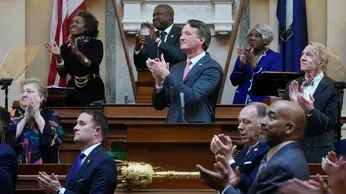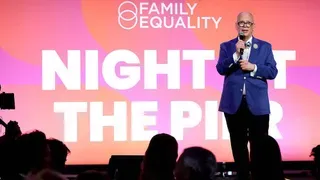
Jan 15
Virginia House Passes Resolutions Protecting Marriage Equality, Voting Rights, More
Olivia Diaz READ TIME: 3 MIN.
The Virginia House of Delegates passed resolutions on Tuesday enshrining rights to abortion, voting and marriage equality in a critical step for Democrats hoping to amend the state's constitution next year.
The chamber, where Democrats hold a razor-thin 51-49 majority, advanced the three proposed constitutional amendments Tuesday while sister resolutions work their way through the Senate. Unlike other bills, proposed constitutional amendments are not subject to vetoes by the governor, but they must be twice passed in at least two years, with a legislative election sandwiched between each legislative session. After that, the public can vote by referendum on the issues.
If the abortion ballot measure is ultimately successful, Virginia would become a rare southern state to join a growing trend of states putting reproductive rights-related ballot questions to voters.
"I trust our Virginia voters," said Democratic Majority Leader Charniele Herring, patron of the amendment protecting abortion. "It seems like the other side of the aisle does not."
In a lively debate, Republicans blasted the proposed amendment to protect abortion, which passed along party lines. Republican Del. Mark Earley described the resolution as a failure to recognize the image of God in fetuses.
"This resolution is not only extreme – and it is," he said on the House floor. "But the real problem with it is that it's fundamentally misguided because it refuses to open its eyes to the lives and futures of children."
Democratic Del. Candi Mundon King called for lawmakers to recognize the lives of women caught in life-threatening pregnancies, in a scathing rebuke of Republicans' arguments.
"Let's pass this resolution so that people who probably couldn't find a uterus with a map are not making decisions about women's health care," she said.
Elsewhere, since 2022, 18 questions have gone before voters across the U.S., and they have sided with abortion rights advocates 14 times. The voters have approved constitutional amendments ensuring the right to abortion until fetal viability in nine states: Arizona, California, Colorado, Maryland, Michigan, Missouri, Montana, Ohio and Vermont. Voters also passed a right-to-abortion measure in Nevada in 2024, but it must be passed again in 2026 to be added to the state constitution.
Democratic lawmakers in both chambers said on Tuesday that the constitutional amendments were central to their legislative agenda this year. In a news conference with Virginia Black legislators, Sen. Jennifer Carroll-Foy said the amendments were critical for the state to shatter inequality.
"Virginia has been going backward for far too long," she said. "We understand that we were the home of segregation ... of slavery, of Jim Crow. And now we are forward-facing and forward-moving. So we need to ensure that our Virginia constitution reflects our values here in Virginia."
In a bipartisan 55-44 vote, lawmakers also voted to revise Virginia's process to restore voting rights for people who served time for felony crimes, which Democrats describe as a relic of disenfranchisement. The vote came after Republican Gov. Glenn Youngkin, to the dismay of voting-rights advocates, rolled back a process to restore people's civil rights after they completed sentences for felonies. Virginia is the only state that permanently bans anyone convicted of a felony from voting unless a governor restores their rights.
In a plea to lawmakers to pass the amendment, Democratic Del. Cia Price said on the Virginia House floor: "We cannot live in the past, we have to live in the present. And presently, we have a governor that is not restoring rights at the rate of previous Republican and Democratic governors, and we're about to have a convicted felon as a president," referencing President-elect Donald Trump, who was convicted by a jury of 34 felony convictions.
Lawmakers have previously attempted to put up the resolutions in 2022 and 2023, though they were unsuccessful in the House, where Republicans previously had an edge. Next year, the amendments' successful passage will likely again hinge upon Democrats' ability to preserve their majority in the statehouse. All seats in the House are on the ballot in November.
The amendment with the most bipartisan support was the resolution protecting marriage equality. Following a 58-35 vote supporting the proposal, Democratic Del. Mark Sickles described his belief that the resolution reflects an evolving Virginia.
"The public opinion changed so much," he said. "Barack Obama was against same-sex marriage at one time, and he changed. Everybody's had a chance to change."
___
Olivia Diaz is a corps member for The Associated Press/Report for America Statehouse News Initiative. Report for America is a nonprofit national service program that places journalists in local newsrooms to report on undercovered issues.







